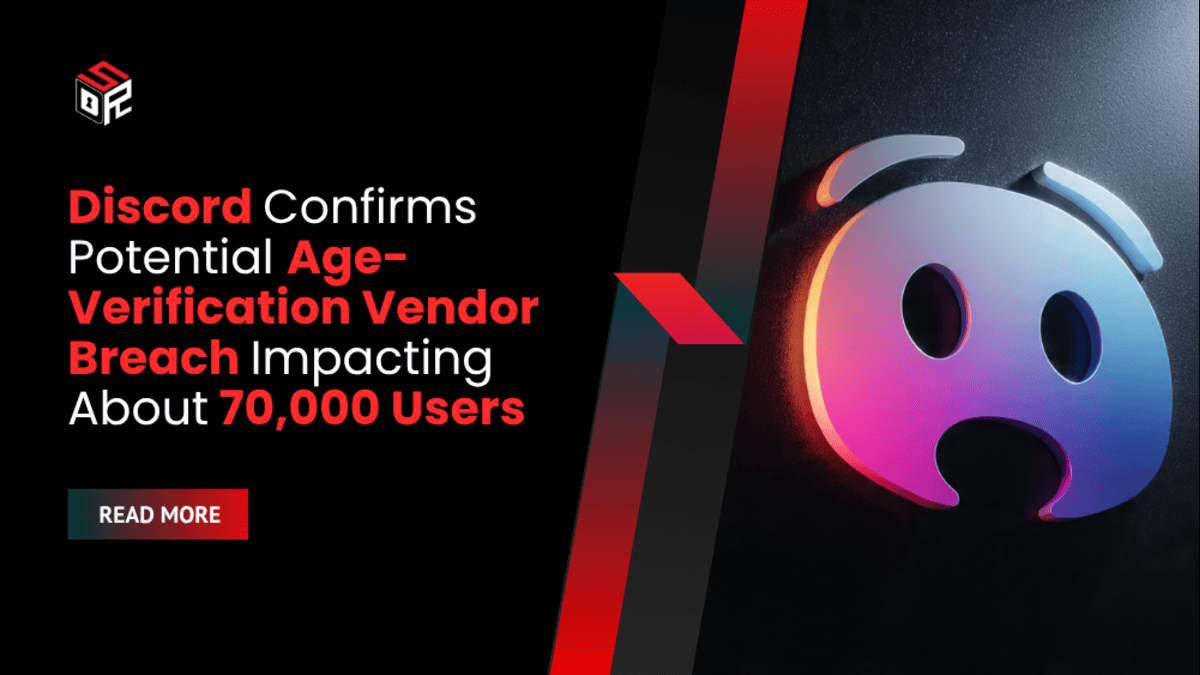Discord has disclosed a potential data breach tied to a third-party age-verification provider that may have exposed official identification photos and other personal data for roughly 70,000 users, the company said. Discord emphasized that its core platform systems were not compromised and that the incident targeted an external vendor contracted to verify users’ ages.
The messaging service, which counts more than 200 million registered users, said the information potentially exposed includes government-issued ID images submitted for age confirmation, partial payment card data, and records of support conversations. Discord noted that complete credit-card numbers, account passwords and user activity beyond support tickets were not included in the compromise and that affected users have been notified.
Third-Party Age-Verification Provider Breach Appears to Have Exposed ID Photos, Support Records and Partial Payment Data
Discord said the breach involved a vendor responsible for processing identity documents submitted by users for age checks. The company did not identify the vendor but confirmed it had severed the provider’s access to Discord systems and was cooperating with law-enforcement authorities on an investigation.
A spokesperson for a well-known customer-service platform used by many companies stated that its platform was not implicated in the incident and that the compromise did not originate from its systems. Discord said those claims by third parties were not relevant to the vendor breach it was investigating.
“We will not reward those responsible for their illegal actions,” a Discord spokesperson said, responding to online posts that alleged the breach affected more users than the company has disclosed.
Discord declined to provide the vendor’s name or further technical details about the intrusion, citing an active law-enforcement inquiry. Company officials said the disclosure followed internal notifications to users who were directly affected and that it had suspended the vendor relationship while the matter is resolved.
Company statements and user reports indicate the exposed dataset may include uploaded images of government IDs used to prove age, partial card numbers retained in support logs, and transcripts or summaries of user interactions with Discord’s support teams. Discord said it was working to determine the full scope of records impacted and to assist users with protective measures.
Exposed Identification Data Raises Long-Term Identity Risks; Platform Balances Safety Measures and Privacy Obligations
Security and privacy specialists note that government-issued ID imagery and related metadata are high-value assets for fraudsters because they do not change over time and can be used in identity-theft and synthetic-identity schemes. Even when full financial account numbers are absent, combinations of ID images, partial payment information and support dialogues can be leveraged for targeted social-engineering, account takeover, and financial fraud.
The disclosure comes amid wider industry scrutiny over age-verification methods for online platforms. Discord has previously undertaken pilot programs involving facial recognition for age checks in specific jurisdictions, and regulators in some countries are requiring platforms that host adult content to implement robust age-verification regimes.
“Personal identification documents remain highly sought after by criminals because they enable long-term fraud and identity misuse,” a data-privacy specialist said. “Third-party vendor security must be part of platform risk assessments.”
Discord said it has advised affected users to monitor financial statements, review interactions recorded in support tickets, and follow steps to secure their accounts, including enabling multifactor authentication where available. The company also said it would provide resources to users concerned about identity theft.
Discord said it has notified all users it believes to be affected and is cooperating with law enforcement. The company cut the third-party provider’s access and launched an internal review of its vendor management and data-handling practices for identity verification processes.
Online speculation that the breach was larger than the company’s estimate prompted Discord to call such claims false and to attribute some of the chatter to extortion attempts. The company said it would not engage with demands for payment and urged users to rely on official communications for accurate information about the scope of the incident.
Discord’s approach—severing vendor access, notifying impacted users, and coordinating with authorities—follows standard incident-response practices. The company did not provide a public timeline for the intrusion’s discovery or the vendor’s remediation steps, citing the ongoing nature of the investigation.
The incident arrives as regulators increasingly press major platforms to demonstrate effective age-verification and content-moderation controls, particularly for services that host adult or user-generated content. In some jurisdictions, online safety rules require “robust” measures to prevent underage access to age-restricted material, placing pressure on platforms to outsource or scale verification capabilities.
Privacy advocates warn that outsourcing identity checks to vendors introduces additional attack surfaces and increases the number of custodians holding highly sensitive personal data. They say platforms must balance regulatory compliance with stringent vendor oversight, encryption of stored identity documents, and minimal retention policies.
Experts recommend that platforms conducting age verification ensure vendors employ strong encryption, strict access controls, regular security audits, and clear breach-notification obligations. Users submitting ID documents should be informed of retention periods and the specific purpose for which data is collected.
Affected users are advised to review account support histories, monitor bank and card statements for anomalous activity, and consider placing fraud alerts with credit bureaus if identity documents appear in follow-on leaks. Law-enforcement agencies and consumer-protection regulators may request further disclosures as investigations progress.
Discord said it will continue to cooperate with investigators and will update impacted users and the public as new information becomes available. The company reiterated that its principal platform systems remain secure and stressed that the incident centered on an external vendor.
As platforms scale identity-verification features to meet safety and regulatory expectations, the Discord incident underscores the privacy and security risks that accompany third-party vendor reliance for highly sensitive data handling.









